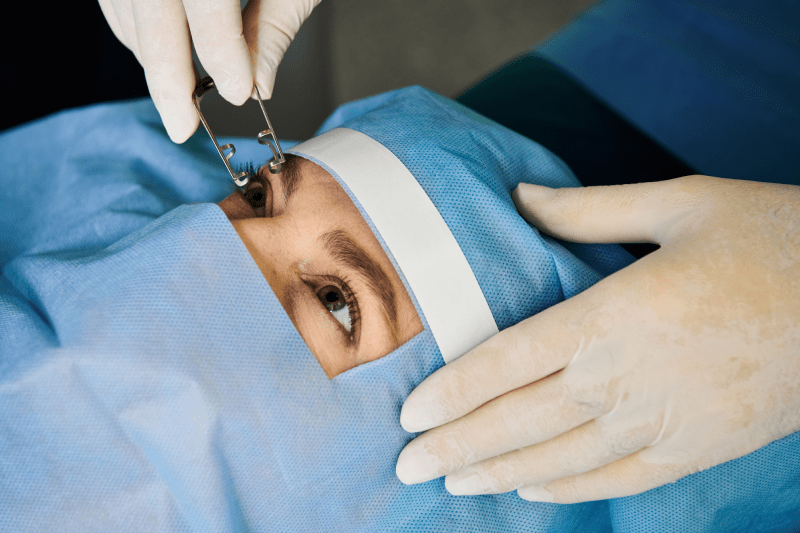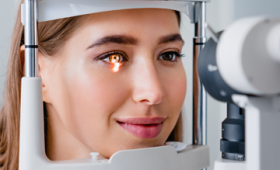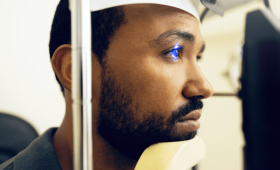What Is LASIK Laser Surgery And How Does It Work?
LASIK (Laser-Assisted In Situ Keratomileusis) surgery is a popular vision correction method that works by reshaping the cornea to allow light to focus correctly on the retina. During the surgery, a thin flap is first created on the top layer of the cornea, and then the underlying corneal tissue is reshaped with an Excimer Laser. Finally, the flap is closed back to its original position. The entire procedure usually takes 10-15 minutes per eye, and the patient is discharged on the same day. This method aims to permanently correct refractive errors such as myopia, hyperopia, and astigmatism.
What Is The Key Difference Between Femto LASIK And Traditional LASIK?
Femto-LASIK (bladeless laser) is distinguished from traditional LASIK primarily by its flap creation method and is a more advanced technology. In the traditional method, the flap is created using a mechanical blade (microkeratome). In Femto-LASIK, this stage is performed with a high-precision laser device called a Femtosecond laser. The absence of a blade allows the flap to be thinner, smoother, and more customizable, which preserves corneal integrity and significantly reduces the risk of dry eyes. Specialists generally recommend Femto-LASIK for safer and more precise results.
Which Vision Defects Does Laser Surgery Permanently Correct?
Laser surgeries can permanently correct the most common refractive errors such as myopia (nearsightedness), hyperopia (farsightedness), and astigmatism (blurred vision). The applicable upper limits are generally up to -10 for myopia, +4 or +5 for hyperopia, and -5 diopters for astigmatism. However, the success of the surgery depends not only on the degree but also on corneal thickness and the suitability of the eye structure. A detailed pre-operative examination determines the maximum defect that can be safely corrected.
How Long Must My Eye Prescription Be Stable For Surgery?
The most basic requirement for suitability for LASIK surgery is that your eye prescription must have remained stable (unchanged) for at least one year prior to the surgery. If the prescription is still changing, the new shape given to the cornea may become insufficient over time, and the prescription may recur. For this reason, physicians generally prefer to perform the surgery on patients who are 18 years of age or older and whose developmental period has ended to ensure this stability. Stability guarantees the long-term nature and permanence of the treatment.
Can I Blink Or Move My Eye During The Surgery?
This is one of the most concerning issues for patients. During the laser surgery, a special eyelid holder (speculum) is used to physically prevent your eyelid from closing. Additionally, modern laser devices are equipped with very fast eye-tracking systems (Eye-Tracker). This system instantly stops the laser even if the patient’s eye makes the slightest movement and resumes when the eye returns to the correct position. This technology reduces the risk of the laser firing at the wrong spot to zero and maximizes surgical safety.
Who Is Not A Suitable Candidate For LASIK Surgery?
Unsuitable candidates for LASIK surgery are generally those with very thin corneas, corneal deformities such as keratoconus, those with systemic diseases like uncontrolled diabetes that slow down wound healing, and pregnant or nursing women. Furthermore, LASIK is not recommended for patients with severe dry eyes or those with progressive eye diseases like glaucoma. The ophthalmologist detects these risk factors through a detailed pre-operative examination and recommends alternative treatments like PRK or ICL (Implantable Collamer Lens) to unsuitable patients.
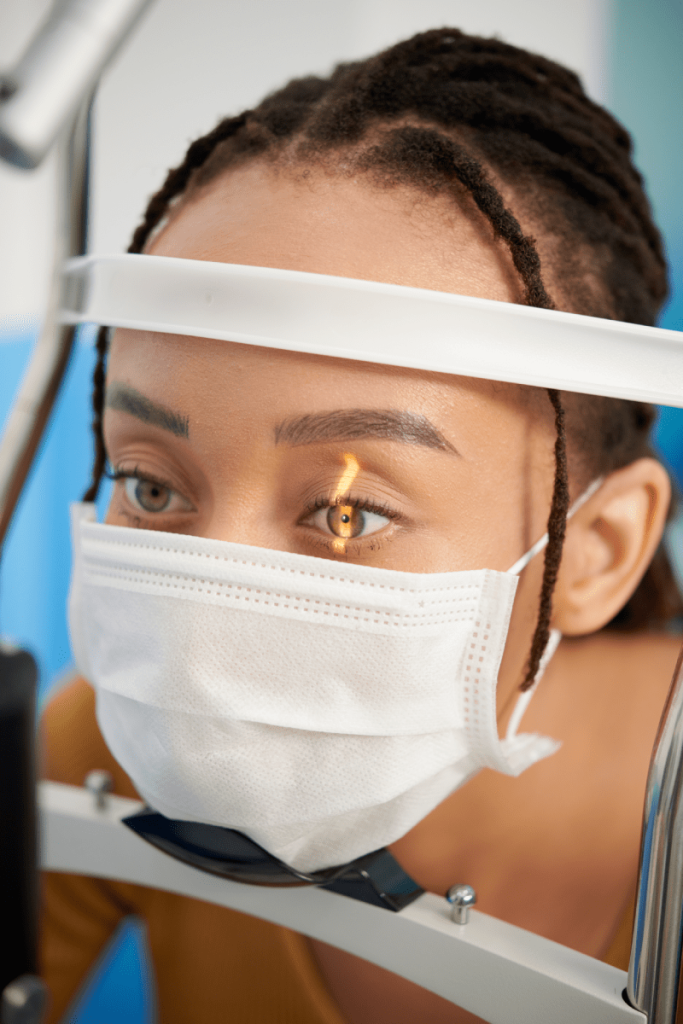
What Is The Risk Of Dry Eyes After Surgery?
Temporary dry eyes are an expected condition in the first months after surgery due to the temporary effect on nerve endings in the cornea caused by the surgical incision (flap creation). However, the use of bladeless techniques like modern Femto-LASIK significantly reduces the severity and duration of this dryness compared to traditional methods. Physicians prescribe intensive moisturizing eye drops to patients to manage this temporary condition. If the dryness rarely lasts longer than 6 months, additional treatment is administered.
What Is The Average Cost Of LASIK Surgery In Turkey?
The average cost of LASIK eye surgery in Turkey varies depending on the laser technology used (Femto-LASIK, i-LASIK) and the scope of the package (transfer, accommodation). However, this cost is 50% to 70% lower compared to prices in Europe and the UK for the same technology and quality of service. The price difference stems from Turkey’s low operational expenses and the exchange rate advantage. This economic structure makes it appealing for patients to receive treatment in Turkey by covering not only the surgery cost but also travel and accommodation expenses.
Why Are LASIK Surgery Prices In Istanbul More Affordable?
The main reason for the affordability of LASIK prices in Istanbul is the high value of foreign currencies like the Euro and Sterling against the Turkish Lira (exchange rate advantage) and the clinics reducing their unit costs due to high patient volume. As Istanbul is the hub of international health tourism, clinics keep their prices competitive. This allows patients to receive the same quality from expert physicians using the latest laser devices at more affordable prices in Turkey.
Are Accommodation And Transfers Included In The Surgery Packages?
Health tourism-focused clinics and organizations (such as Cure Holiday) generally offer comprehensive packages that include VIP airport transfers and short-term accommodation in 4 or 5-star hotels during the treatment period for the comfort of international patients. The inclusion of these services in the package completely eliminates the patient’s logistical stress in Istanbul and allows them to focus only on the treatment and rest. This way, the patient can focus solely on their treatment while receiving treatment in Turkey.
How Is Femto LASIK Technology Reflected In The Price
Femto-LASIK (bladeless laser) technology has a higher cost compared to traditional LASIK. This difference arises from the high investment and operational cost of the femtosecond laser device. However, this extra cost should be viewed as a necessary investment because it increases the safety, precision, and reduces the risk of complications (especially flap-related risks) of the surgery. This advanced technology is still offered in Turkey at costs below the standard laser prices in Europe.
Are Medications And Eye Drops Included In The Price After Surgery?
Yes, reliable and institutional clinics generally include all medications and eye drops (antibiotic and cortisone-containing) that the patient must use during the post-operative recovery process in the package price. These medications are vital for preventing the risk of infection and ensuring the healthy healing of the cornea. This service saves patients the trouble of searching for medication in Turkey and increases comfort while receiving treatment in Turkey.
Is A Second Laser Intervention (Touch Up) Charged?
Rarely, a small prescription may remain after a successful LASIK. Institutional clinics generally guarantee a second laser intervention (Touch-Up) free of charge if deemed necessary by the physician within one year after the surgery. This guarantee shows the clinic’s confidence in its result quality. However, the duration and scope of this warranty are determined by contract. This is an important assurance that ensures the patient’s long-term satisfaction and is an advantage of receiving treatment in Turkey.
Does The Surgery Price Increase If My Eye Prescription Is Very High?
In LASIK surgery, the price generally depends on the laser technology used (Femto vs. PRK) and the type of surgery (LASIK vs. ICL), but high prescription levels generally do not make a big difference in the price of laser surgery. However, patients with high prescriptions who have insufficient corneal thickness may require a different procedure like Intraocular Lens (ICL) implantation, which has a higher cost than LASIK. In this case, the total cost may increase significantly.
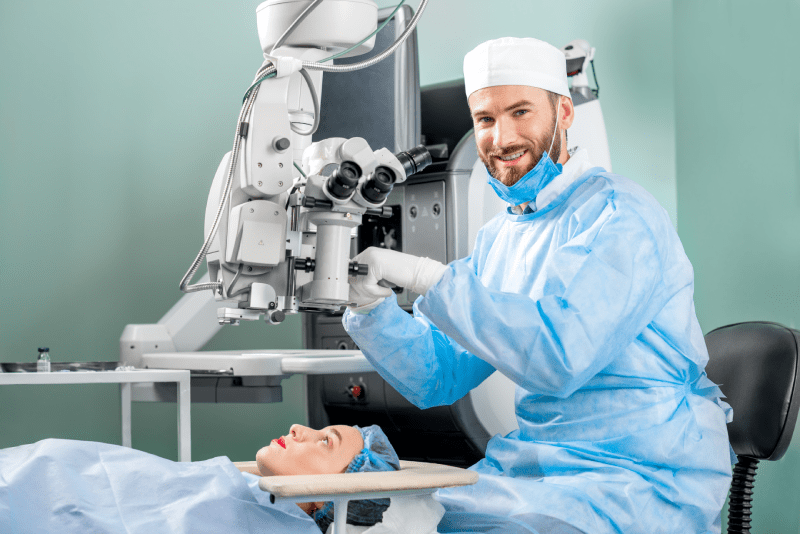
Are Post-Operative Check-Up Appointments Included In The Price?
Post-operative check-up appointments (usually 1st day, 1st week, 1st month, and 6th month) are critical for monitoring the success of the treatment and ensuring the flap has healed healthily. Clinics in Turkey include these initial check-up appointments in the package price and do not charge extra. The first-day check-up is mandatory and vital for international patients. Long-term check-ups are generally managed according to the physician’s guidance.
What Is The Age Limit For LASIK And Is There An Upper Age Limit?
The lower age limit for LASIK surgery is generally 18, as eye prescriptions still tend to change before this age, and jawbone development continues. Prescription stability is essential for the surgery to be permanent. Although there is no strict upper age limit, patients are generally directed to different solutions like Presbyopia Laser or Intraocular Lens due to near vision problems (Presbyopia) that begin after the age of 40.
In Which Cases Is PRK Preferred Over LASIK?
PRK (Photorefractive Keratectomy) is preferred for patients with very thin corneas unsuitable for LASIK, those with a high risk of impact (athletes), or those with insufficient corneal thickness. In PRK, no flap is created; only the uppermost layer of the cornea is removed, and the laser is applied directly. PRK’s cost is generally lower than LASIK, but the recovery time is longer and there may be more pain in the first days. The physician recommends the safest method based on the patient’s corneal thickness.
When Is The Return To Normal Life After The Surgery?
The return to normal life after LASIK surgery is very fast. Most patients begin to see clearly within one day after the surgery and can return to their daily activities (using a computer, reading). Resuming driving should wait for the physician’s approval (usually after 1-2 days). The duration for avoiding risky situations like eye makeup and pool/sea activities is generally 1 to 2 weeks. This short recovery period allows patients to return to their work lives quickly.
How Long Is Glasses Or Lens Use Not Needed After Surgery?
After a successful LASIK surgery, almost 98% of patients do not need glasses or contact lenses. Since the laser surgery permanently corrects the existing refractive error (myopia, hyperopia, astigmatism), patients generally achieve clear vision the next day. However, near vision needs (presbyopia), which is a natural aging process occurring after the age of 40, do not mean the LASIK has failed and may require additional solutions.
How Long Should I Avoid Rubbing My Eyes After Surgery?
Rubbing the eyes is strictly forbidden after the surgery and should be avoided for at least one month. Rubbing the eyes, especially during the first critical week for the flap to solidify, can cause the flap to slip, wrinkle, or lead to infection underneath. Physicians provide protective eye shields for patients to wear while sleeping at night to prevent this risk. Adherence to these rules is vital for the success of the surgery.
When Can Sports And Swimming Be Resumed After Surgery?
The time to resume sports and swimming activities after surgery varies depending on the level of risk. Light exercises and walks can usually be done ** after 2-3 days**. However, heavy sports that pose a risk of impact to the eye (boxing, basketball, etc.) and swimming (sea, pool) activities should be avoided for at least 2 weeks (preferably 1 month). Water and sweat getting into the eye can increase the risk of infection, so waiting for the physician’s permission is crucial.
How Long Do Night Vision Problems Last After Surgery?
Some patients may experience temporary reduced night vision, halos, or glare after LASIK surgery. This condition is caused by the cornea adapting to its new shape. Such problems generally gradually decrease and disappear within a few weeks to a few months. If this condition persists longer than 6 months, it may be corrected with a more personalized laser treatment like Wavefront (i-LASIK). This is not a permanent failure, but physician follow-up is important.
Is The Use Of Protective Glasses Mandatory After Surgery?
Yes, the use of protective glasses or sunglasses is absolutely mandatory immediately after the surgery and for the first few days. These glasses protect the eyes from UV rays, dust, wind, and external factors. UV rays can cause scar tissue to form in the healing cornea. Wearing protective shields, especially when going outside and while sleeping on the first night, is critical to preventing flap slippage and the risk of infection.
Which Treatments Are Applied To High Prescription Patients (Over 10 Diopters)?
While LASIK is generally applied up to -10 diopters, alternatives such as Intraocular Lens (ICL) implantation are recommended for patients with higher myopia (e.g., -12 or -15). In ICL surgery, a permanent lens is placed inside the eye, preserving the patient’s natural lens. ICL’s cost is higher than LASIK, but it is considered the safest and most successful solution for patients with very high prescriptions or weak corneal structure. These treatments are performed by specialists in Istanbul.

Which Specialization Should Be Preferred For The Best Eye Surgery In Istanbul?
To achieve the best LASIK result in Istanbul, Ophthalmology Specialists who are particularly specialized in Corneal and Refractive Surgery should be preferred. Successful laser surgery depends not only on device quality but also on the physician’s precision in flap creation, laser planning, and accurate pre-operative diagnosis. Organizations like Cure Holiday cooperate with physicians who have international experience and high case volume in this field.
Why Is Choosing Turkey For Treatment The Most Logical Decision?
Choosing Turkey for treatment is the most logical decision due to the combination of cost-effectiveness, high technology, and high level of expertise. There is a 50-70% price advantage in Turkey compared to the exorbitant prices in Europe. Furthermore, clinics in Turkey generally use the most up-to-date laser devices (Femto-LASIK), and physicians have gained international experience through high case volume. The packaging of all logistical processes (transfer, accommodation) excluding airfare through organizations like Cure Holiday allows patients to focus on treatment without stress.
Which Devices (Laser Devices) Should Be Checked In The Clinic?
The laser devices used in the clinic should be of the latest technology (e.g., Femtosecond laser and Excimer laser with Wavefront feature) and internationally approved brands (ZEISS, Alcon, AMO, etc.). The newness and maintenance of the devices directly affect the surgery’s precision and thus the success rate. Reliable clinics share the brand and maintenance certificates of these devices with patients transparently. Receiving treatment in Turkey ensures access to this technological infrastructure.
What Are The Risks Of Having Laser Surgery In Turkey?
The risks of having laser surgery in Turkey are no higher than those in Western countries, provided the surgery is performed in institutional hospitals with international accreditation. Risks are generally limited to flap slippage, infection, or permanent dry eyes, and these are minimized by experienced physicians and high hygiene standards. The real risk is focusing only on the price and having surgery in uncertified, cheap, and unreliable clinics. Cure Holiday helps patients avoid such risky clinics.
How Many Days Of Accommodation Is Required In Istanbul For Surgery?
An average of 3 to 4 days of accommodation is recommended in Istanbul for LASIK surgery. This period ensures the completion of the detailed pre-operative examination, the surgery itself, and the mandatory critical check-up on the day after the surgery. The first check-up is vital for ensuring the flap is in the correct position. This short accommodation period eliminates the patient’s need to take a long break from work.
Are There Hidden Costs That May Be Encountered Outside The Surgery Package?
Transparent and institutional clinics avoid hidden costs. However, unexpected costs that the patient may encounter are generally: the fee for switching to Intraocular Lens (ICL) when LASIK is unsuitable (very thin cornea), emergency treatment for another medical issue before surgery, or extra drop/treatment costs for long-term dry eyes. Organizations like Cure Holiday transparently list these risks after the pre-operative examination.
How Do Pre-Operative Tests Determine The Possibility Of Surgery Failure?
Corneal topography (shape map) and pachymetry (thickness measurement) tests performed before the surgery are the most critical factors determining the likelihood of the surgery being successful. A sufficient thickness and regular shape of the cornea ensure the laser can be applied safely. The physician uses these test results to definitively determine the patient’s suitability for surgery (e.g., risk of myopia regression). The detailed performance of these tests is the most important safety step when receiving treatment in Turkey.
Will Eye Prescription Recur After Surgery?
The recurrence of eye prescription (myopia returning) after a successful LASIK surgery is rare and generally not permanent. Regression usually occurs in patients whose prescription was not stable before the surgery or in high-prescription patients. Physicians require at least one year of stability before surgery to minimize this risk. If a small regression occurs, it is generally corrected with a free Touch-Up guarantee. Near vision needs after the age of 40 are a natural aging process, not regression.
How Does The High Case Volume of Turkish Physicians Affect Quality?
The high case volume of Turkish physicians directly affects quality by increasing their practical skills and ability to manage complex cases. Ophthalmologists gain high-level experience with different corneal types and prescription combinations by performing hundreds of laser surgeries annually. This intense practical experience shortens the surgery time, increases the precision of flap creation, and reduces the risk of complications. This experience factor is the greatest assurance of quality when receiving treatment in Turkey.
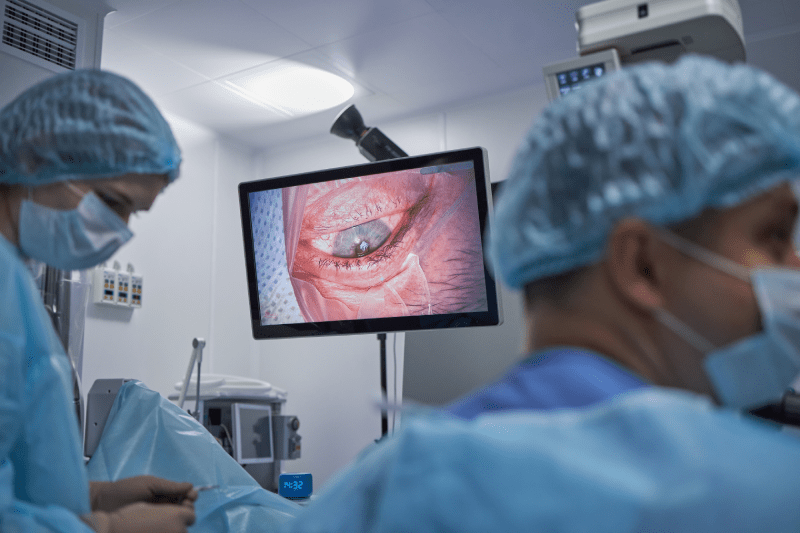
How Is The Language Barrier Overcome During The Treatment Process?
Health tourism-focused clinics in Turkey employ fluent English-speaking coordinators, translators, and healthcare personnel for the comfort of international patients. Organizations like Cure Holiday provide continuous translation support from the first contact to the final check-up. This support guarantees that the patient fully understands medical instructions, manages their concerns, and completes the treatment process stress-free.
Why Is Intraocular Lens (ICL) Surgery More Expensive Than LASIK?
Intraocular Lens (ICL) surgery is more expensive than LASIK because it is a surgical procedure where a special lens is placed inside the eye instead of reshaping the cornea. The cost difference stems from the high production cost of the lens, the necessity of performing the surgery in a hospital environment (operating room), and the requirement for longer specialization. ICL is accepted as the only and safest solution for patients with very high myopia, hyperopia, or thin corneas, justifying this cost difference.
Can Post-Operative Check-Ups Be Done In My Own Country?
The first-day check-up after surgery is mandatory at the clinic in Istanbul. Subsequent check-ups (1st week, 1st month, 6th month) can be performed through online consultation or in collaboration with an ophthalmologist in the patient’s own country, organized by Cure Holiday. Turkish physicians generally manage the process by remotely tracking the results (visual acuity). This flexibility is a logistical convenience of receiving treatment in Turkey.
How Much Do Surgery Prices Increase Annually?
LASIK surgery prices in Turkey do not show a large annual increase in foreign currency terms because clinics aim to maintain internationally competitive prices. However, small adjustments may be made to prices in Turkish Lira terms due to increased labour and operational costs. Early booking and price locking help the patient preserve their budget. Physicians keep price increases minimal to continue making receiving treatment in Turkey attractive.
Which Season Or Month Is Most Suitable For Surgery?
There are no medical restrictions on the most suitable season for LASIK surgery; it can be performed safely in any season. However, for comfort, it is recommended that patients prefer Spring (April-June) and Autumn (September-October), as protection from the sun and wind is required in the first week. These months also offer ideal weather conditions for sightseeing in Istanbul. In summer, continuous use of sunglasses is necessary due to the intense sun.
When Can Eye Makeup Be Applied After Surgery?
To prevent the risk of post-operative infection and ensure the healing of the corneal flap, eye makeup (especially mascara, eyeliner, and eyeshadow) and contact lens use should be strictly avoided for at least 1 week (preferably 2 weeks). This period is necessary to eliminate the risk of makeup residue getting under the flap and causing infection. New makeup products should be used after the first week.
What Is The Contribution Of Using High Technology (Femto Laser) To Surgical Safety?
The contribution of using high-technology Femto Laser to surgical safety is very high. Since this technology creates the flap with a laser instead of a blade, it allows the flap thickness to be controlled with millimetric precision and almost completely eliminates flap-related complications (irregular flap, flap tear). This increased safety is vital, especially for patients with thin corneas or high prescriptions, and demonstrates the technological quality of receiving treatment in Turkey.
When Is The Use Of Glasses Completely Discontinued After Surgery?
The use of glasses is generally completely discontinued the day after the surgery following the first check-up. The patient’s visual acuity is measured during this check-up, and they are allowed to resume daily activities, including safe driving. The only exception is the need for reading glasses after the age of 40, which cannot be corrected by the laser. Glasses used for myopia or astigmatism are permanently discontinued.
How Is The Total Cost Compared When Accommodation Is Included In The Surgery Price?
Even when accommodation is included in the surgery price, the total cost in Turkey is still 50-70% lower than the cost of the operation alone in the UK or Europe. For example, a LASIK surgery costing £4,000 (including accommodation and transfer) in Turkey protects the budget compared to a surgery costing £8,000-£10,000 in Europe. This is an advantage that allows patients to receive both treatment and accommodation comfort within the same budget.
What Are The International Accreditation Certificates Of Clinics In Turkey?
The international accreditation certificates of reliable clinics in Turkey include JCI (Joint Commission International), ISO (International Organization for Standardization), and the T.R. Ministry of Health Health Tourism Authorization Certificate. JCI and the Health Tourism Authorization Certificate confirm that the clinic meets international standards in patient safety, hygiene, and quality of treatment. Cure Holiday cooperates only with centers that have these accreditations.
Is Pre-Operative Dry Eye Treatment Necessary?
Since LASIK surgery can cause temporary dry eyes, treatment of existing dry eyes before the surgery is mandatory. The physician will not perform the surgery without controlling the dryness with special drops or medications. This pre-treatment speeds up the post-operative recovery process and minimizes the risk of permanent dryness. This treatment cost may be calculated separately from the LASIK package.
What Should Be Done For Presbyopia (Near Vision) After LASIK?
There are three main solutions for Presbyopia (difficulty seeing close up) that occurs in patients aged 40 and over after LASIK surgery: 1) Using reading glasses, 2) Having surgery with the Monovision technique (one eye for far, the other for near), or 3) Multifocal Intraocular Lens implantation. The physician presents the most suitable option based on the patient’s lifestyle and expectations. This is the eye’s natural aging process, not a failure of the LASIK.
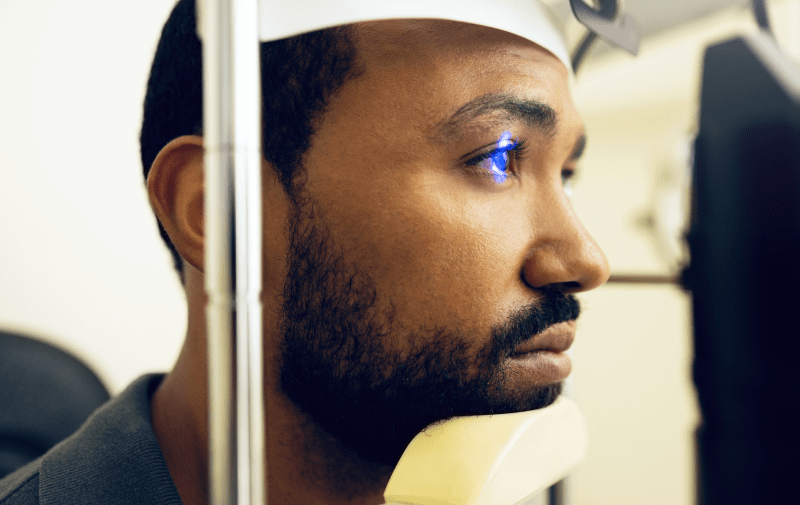
Is There A Guarantee For Refund Or Revision If The Surgery Fails?
Institutional clinics generally offer a free correction or revision surgery guarantee if the LASIK surgery fails (e.g., flap slippage or infection). However, a refund guarantee is not common. The physician determines the patient’s suitability for the surgery beforehand, maximizing the success rate. Cure Holiday ensures that all warranty conditions are clearly set out before the surgery.
What Is The Quality Warranty Period Of The Lenses Used In Intraocular Lens Treatment?
The lenses used in Intraocular Lens (ICL) treatment are generally suitable for lifelong use and are supported by a lifetime product warranty from the manufacturer. These lenses offer high biocompatibility and long-term durability. The quality and originality of the lens are confirmed by the serial numbered warranty card given to the patient at the end of the surgery. This card has international validity.
How Long Should Protective Glasses Be Used After Surgery?
The use of sunglasses after surgery is mandatory for at least 1 month during the day to protect from UV rays. UV rays can negatively affect the healing process of the cornea. Protective shields should be used while sleeping at night, especially in the first week, to prevent the eye from being hit or rubbed. UV-protected sunglasses without prescription are sufficient during the day.
Which Rules Must Be Followed For The Long-Term Success Of The Surgery?
The most important rules to follow for the long-term success and permanence of the surgery are regular use of the drops and medications prescribed by the ophthalmologist, avoiding impact or water contact with the eye for the first month, and continuing regular annual eye check-ups. Limiting smoking and alcohol consumption also supports the continuation of success by protecting general eye health.
How To Book An Appointment In Istanbul Through Cure Holiday?
Cure Holiday selects the most suitable and accredited eye center for you and plans your treatment process. The first step involves examining the patient’s pre-reports and eye prescriptions. Then, clinic appointments, VIP transfers, and hotel accommodation are arranged to fit the flight ticket dates. Cure Holiday manages all logistics and language support, ensuring the patient receives treatment safely and stress-free in Istanbul. It is the best starting point for those who want to receive treatment in Turkey.
